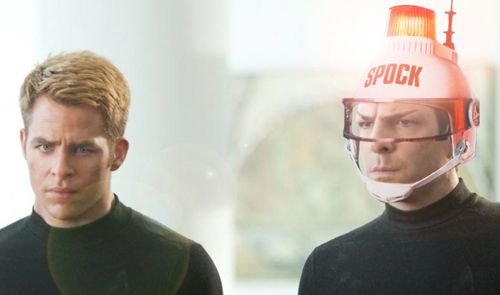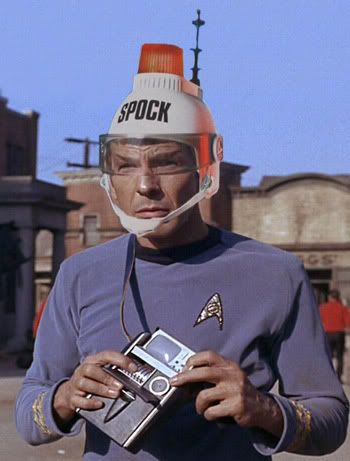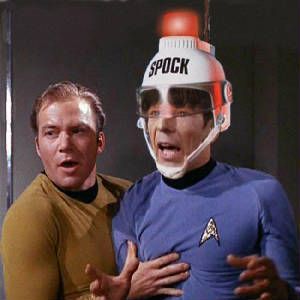-
Welcome! The TrekBBS is the number one place to chat about Star Trek with like-minded fans.
If you are not already a member then please register an account and join in the discussion!
You are using an out of date browser. It may not display this or other websites correctly.
You should upgrade or use an alternative browser.
You should upgrade or use an alternative browser.
Are the changes to TOS lore here to stay?
- Thread starter albion432
- Start date
^ I couldn't possibly comment.
It would definitely have me taking more interest in the Spock/Uhura romance!

Well, be fair: they can save the hat. But the lens flares have got to go.

I would pay good money to see Leonard Nimoy in that....
You're in luck. Leonard ran into a financial rough patch and agreed to model the hat for a modest fee:

Not really.
But this happened:

 Guess it says something that the helmet fits so much better on Quinto....
Guess it says something that the helmet fits so much better on Quinto....Of course, a helmet very much like that has been seen on a hero character in a major genre production (11:30-ish):
[yt]http://www.youtube.com/watch?v=0ymFxkFfIhU[/yt]
The two Abrams films are just about the most financially successful Trek films in history, not to mention among the most critically well-regarded. Their detractors like to pretend that the films were flops, but that's completely counterfactual. Hard evidence, not "speculation," shows clearly that these films are hits, more popular than any incarnation of Star Trek has been since the heyday of TNG two decades ago. There can be legitimate criticisms raised of their content and quality, but there is no denying their popularity with the mass audience. At this point it makes no sense to pretend they'll somehow be forgotten.
Yes and no. They were indeed hits, popularly and financially. Critical reception was essentially "great popcorn fun" on average. But that's exactly the sort of film that is forgotten in the long run.
Yeah, like Star Wars, who the hell remembers that?The two Abrams films are just about the most financially successful Trek films in history, not to mention among the most critically well-regarded. Their detractors like to pretend that the films were flops, but that's completely counterfactual. Hard evidence, not "speculation," shows clearly that these films are hits, more popular than any incarnation of Star Trek has been since the heyday of TNG two decades ago. There can be legitimate criticisms raised of their content and quality, but there is no denying their popularity with the mass audience. At this point it makes no sense to pretend they'll somehow be forgotten.
Yes and no. They were indeed hits, popularly and financially. Critical reception was essentially "great popcorn fun" on average. But that's exactly the sort of film that is forgotten in the long run.
The two Abrams films are just about the most financially successful Trek films in history, not to mention among the most critically well-regarded. Their detractors like to pretend that the films were flops, but that's completely counterfactual. Hard evidence, not "speculation," shows clearly that these films are hits, more popular than any incarnation of Star Trek has been since the heyday of TNG two decades ago. There can be legitimate criticisms raised of their content and quality, but there is no denying their popularity with the mass audience. At this point it makes no sense to pretend they'll somehow be forgotten.
Yes and no. They were indeed hits, popularly and financially. Critical reception was essentially "great popcorn fun" on average. But that's exactly the sort of film that is forgotten in the long run.
Yeah, the same was said about "Star Trek II: The Wrath of Khan" in 1982 -- and most of the critical fan reviews focused on the glaring continuity gaffes (The fact the Reliant's sensors could tell a planet had exploded, see the resulting debris field on approach, etc; that Khan says to Chekov - "I NEVER forget a face..." - yet the Chekov character wasn't IN "Space Seed" because the character wasn't added to the show until it's second season, etc.); but praised the film because even with all it's plotholes and continuity gaffes it was enjoyable and entertaining.
^^^
It really is a shame that even with those type of reviews, practically no one remembers "Star Trek II: THe Wrath of Khan" 32 years later...oh, wait!

Yeah, the same was said about "Star Trek II: The Wrath of Khan" in 1982 -- and most of the critical fan reviews focused on the glaring continuity gaffes (The fact the Reliant's sensors could tell a planet had exploded, see the resulting debris field on approach, etc; that Khan says to Chekov - "I NEVER forget a face..." - yet the Chekov character wasn't IN "Space Seed" because the character wasn't added to the show until it's second season, etc.); but praised the film because even with all it's plotholes and continuity gaffes it was enjoyable and entertaining.
^^^
It really is a shame that even with those type of reviews, practically no one remembers "Star Trek II: THe Wrath of Khan" 32 years later...oh, wait!
+1
Yeah, the same was said about "Star Trek II: The Wrath of Khan" in 1982
Uh, no.
Beaker may be right or may not, none of us can read the future, but don't let's go pretending this is 1982. That tactic never persuades anyone because it's actually a meaningless and false comparison and the films involved are substantively different.
Beaker may be right or may not, none of us can read the future, but don't let's go pretending this is 1982. That tactic never persuades anyone because it's actually a meaningless and false comparison and the films involved are substantively different.
But so are audiences and they will continue to be well into the future. For all we know, people may feel the same way about Into Darkness in thirty-two years as folks feel about TWOK today.
You desperately seem to be trying to sell that they won't. So I'll quote a poster from around these parts:
...none of us can read the future...
Actually I've recently been listening to the Superman radio series on the Internet Archive, and the original version of Superman's origin story was totally bizarre. Episode 1 tells the story of Jor-L (as his name was originally spelled) and the death of Krypton just as you'd expect, ending with the baby Kal-L being launched in a rocket from the dying planet -- but then episode 2 opens with an adult Superman arriving in that selfsame rocket in his full costume, somehow with a full knowledge of 1940s American English.
For me the really disturbing element of Superman Radio, Episode 1, is that it's fairly clear Krypton is another planet in our solar system, and that it's being destroyed because of Gravity Issues that are being shed by its sun. And, ah, our sun. Keep watching the skies!
More subtly unsettling to me is that Jor-L's wife, in this world of super-men developed to the peak of physical and intellectual ability, apparently had no idea there was a planet name of ``Earth'' in her solar system. I know, I know, she has to ask questions so the audience can overhear the answers, and this example isn't even in the bottom two quartiles of Old Time Radio Exposition, but, wow.
Still, listening to the way Superman's origin was presented way back then provides a touching sense of continuity to me: worlds may change, galaxies crumble, and occasionally Jor-El won't sound like a raving looney with a blog full of exclamation points and misspelled sciencey words, but the High Council of Krypton will always be a bunch of jerkfaces.
On the other hand, nuTrek has yet to give us the Trek version of Harley Quinn or Jimmy Olsen--a new breakout character who will be incorporated into future versions. Maybe next movie?
I'm getting on the Science Officer 0718 bandwagon, myself.
Yeah, the same was said about "Star Trek II: The Wrath of Khan" in 1982
Uh, no.
Beaker may be right or may not, none of us can read the future, but don't let's go pretending this is 1982. That tactic never persuades anyone because it's actually a meaningless and false comparison and the films involved are substantively different.
I don't know. The criticisms were largely the same. That it wasn't as "cerebral" as TMP. That it was more violent and more about space battles and defeating a larger-than-life supervillain than about Gene's "utopian" vision and all that. That it played fast and loose with the continuity. (Wait, Khan's followers are now all blond Aryan youths?) Hell, people threatened to boycott the movie because it killed Spock--which kinda makes killing Amanda small potatoes by comparison.

Granted, it didn't reset the timeline, so there were no interminable debates about preserving the "canon," but, yeah, there's a fair amount of deja vu here for those of us who remember 1982 . . . and 1987 . . . .
I don't know. The criticisms were largely the same. That it wasn't as "cerebral" as TMP. That it was more violent and more about space battles and defeating a larger-than-life supervillain than about Gene's "utopian" vision and all that. That it played fast and loose with the continuity. (Wait, Khan's followers are now all blond Aryan youths?)
Heck, I still have those complaints about it to this day.
Hell, people threatened to boycott the movie because it killed Spock--which kinda makes killing Amanda small potatoes by comparison.
Oh, yes, of course. There were plenty of fans who refused to count TWOK as part of their "personal canon" (though I don't think anyone used that oxymoron yet) because they refused to accept that Spock was dead -- probably not unlike the whole "NOT. DEAD." phenomenon after Trip Tucker's death in the ENT finale. If the very next movie hadn't reversed his death, there might still be a fair-sized contingent of Trekkies who rejected everything after TMP.
Granted, it didn't reset the timeline, so there were no interminable debates about preserving the "canon," but, yeah, there's a fair amount of deja vu here for those of us who remember 1982 . . . and 1987 . . . .
Yup... It was years before TOS fandom really embraced TNG as a legitimate continuation. A lot of the TOS actors themselves objected to it quite vocally, probably uneasy with the competition and fearing that they might be replaced in future movies. Which, of course, they eventually were, but by that point TNG had won over its detractors.
I don't know. The criticisms were largely the same.
The observation that STID is pure popcorn cinema in a different vein from TWOK isn't even necessarily a "criticism;" it's something quite commonly observed even by people who like the film. As, to his credit, Beaker did in fact note. This "butbutbut 1982" and/or "there are fans who complain after every movie" business gets pretty contortionist...ic...al* pretty routinely. It depends heavily on there being no actual difference between the films, which is a fairly obviously nonsensical proposition whether you're a fan of the new films or not.
* It's a word. What?

Christopher said:If the very next movie hadn't reversed [Spock's] death, there might still be a fair-sized contingent of Trekkies who rejected everything after TMP.
Always thought he should have stayed dead, personally. But I can see why they were careful to leave themselves the opening.
Last edited:
^Nobody's saying there's no difference between the films. Just that the rhetoric of the people rejecting the films as "not real Trek" are very much the same.
Frankly, I think TWOK is an extremely stupid movie in a lot of ways, with a lot that doesn't make any sense, that throws out credibility in favor of melodrama, and that dwells too much on action and violence. But people like this mess of a movie because they think it handles the characters well. I see that as extremely similar to the Abrams movies -- they have their plot and credibility problems, but the characters and the heart of the films work very well. As for the different styles of the two, that's just a matter of adapting to the era. TWOK was an attempt to reinvent Trek for the post-Star Wars era when SF films were expected to be action- and space-battle-driven rather than cerebral and philosophical. The Abrams films reinvent Trek for the blockbuster era of the 2000s. Of course the specifics are different, because the eras are different. But the intent and principle are the same.
Frankly, I think TWOK is an extremely stupid movie in a lot of ways, with a lot that doesn't make any sense, that throws out credibility in favor of melodrama, and that dwells too much on action and violence. But people like this mess of a movie because they think it handles the characters well. I see that as extremely similar to the Abrams movies -- they have their plot and credibility problems, but the characters and the heart of the films work very well. As for the different styles of the two, that's just a matter of adapting to the era. TWOK was an attempt to reinvent Trek for the post-Star Wars era when SF films were expected to be action- and space-battle-driven rather than cerebral and philosophical. The Abrams films reinvent Trek for the blockbuster era of the 2000s. Of course the specifics are different, because the eras are different. But the intent and principle are the same.
Just that the rhetoric of the people rejecting the films as "not real Trek" are very much the same.
Which unfortunately is only interesting if all other things are equal. (I'm betting you can find superficially similar criticism of almost any Trek film. That doesn't make them all unjustly-excoriated classics being victimized by the dyspeptic fanboisie.)
Frankly, I think TWOK is an extremely stupid movie in a lot of ways, with a lot that doesn't make any sense, that throws out credibility in favor of melodrama, and that dwells too much on action and violence.
I've seen people try to make this case for this in detail before, and it usually turns out to be hard work in the same way that making the case for, say, the coherency of STID's story is hard work. But it's always up for debate, of course. (As I've remarked elsewhere before, I'm amused that one mostly sees this critique re-emerge in the modern day as a by-association method of "defending" STID -- and it's amusing in part because I think it's just as useless for that purpose as it was for attacking the film on its own merits originally. But mileage varies, obviously.)
...I'm amused that one mostly sees this critique re-emerge in the modern day as a by-association method of "defending" STID -- and it's amusing in part because I think it's just as useless for that purpose as it was for attacking the film on its own merits originally. But mileage varies, obviously.)
It isn't re-emerging, its always been there. You think the only time people have discussed plot holes from TWOK is after Into Darkness came out?
The biggest problem is that most of Trek doesn't rate very well when you go over it with as fine-toothed comb as people go over the Abrams films. I think you know that and that's why you try to dissuade such comparisons. In my opinion...
You think the only time people have discussed plot holes from TWOK is after Into Darkness came out?
Only time? No, but I do see the standard "supposedly-crazy fanboy" critique wielded routinely in that context. It would be fairer to say that I'm not just talking Christopher's sort of objection -- which I don't think works but is at least reasonably sane -- but even moreso stuff like "You think STID had plot holes? Well, how did Khan recognize Chekov, smart guy! BOO-YAH!" That sort of... eccentricity. (And don't go telling me you haven't seen it, now.
 )
)Similar threads
- Replies
- 152
- Views
- 38K
- Replies
- 32
- Views
- 2K
- Replies
- 47
- Views
- 17K
- Replies
- 32
- Views
- 3K
- Replies
- 0
- Views
- 403
If you are not already a member then please register an account and join in the discussion!
